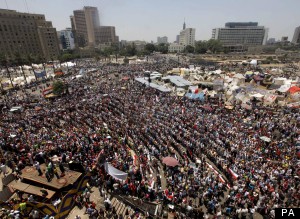Thousands of people have gathered in cities across Egypt to demand the resignation of the Islamist president, Mohammed Morsi, amid growing fears of a civil war.
In Cairo protestors gathered in Tahrir Square, the scene of 2011's revolution, and marched to the presidential palace.
Sunday marks the one-year anniversary of his inauguration but many are disillusioned with his rule and accuse him of failing to tackle security and economic problems.
Previously fragmented liberal and secular groups have been united under the banner of a grassroots movement called Tamarod (Rebellion).
A petition started by the group calling for a change in government has been signed by 22 million people, reports Sky news.
One protester, Hanan Bakr, told the BBC: "I'm hoping to stay on the streets until the whole regime of the Brotherhood is brought down.
"We are seeking the support of the country to stand behind the second Egyptian revolution. If Egypt falls under Islamist extremism, this will affect the whole region... Egypt is for all religions - I am a Muslim who attended an Armenian Catholic school."
Morsi and his party, the Muslim Brotherhood, remain defiant in the face of the protests. In an interview with the Guardian he insisted there would be no second revolution like the Arab spring in 2011 that led to his appointment.
He said: "There is no room for any talk against this constitutional legitimacy. There can be demonstrations and people expressing their opinions.
"But what's critical in all this is the adoption and application of the constitution. This is the critical point."
The Egyptian military has said it will step in if violence spirals out of control.
US president, Barack Obama, urged "all parties to make sure they are not engaging in violence and that police and military are showing appropriate restraint".
The protests have been preceded by street fighting across the country that has caused several deaths and numerous injuries.
An American, 21-year-old Andrew Pochter, was killed in Alexandria on Friday.
Original Article
Source: huffingtonpost.co.uk
Author: The Huffington Post UK
In Cairo protestors gathered in Tahrir Square, the scene of 2011's revolution, and marched to the presidential palace.
Sunday marks the one-year anniversary of his inauguration but many are disillusioned with his rule and accuse him of failing to tackle security and economic problems.
Previously fragmented liberal and secular groups have been united under the banner of a grassroots movement called Tamarod (Rebellion).
A petition started by the group calling for a change in government has been signed by 22 million people, reports Sky news.
One protester, Hanan Bakr, told the BBC: "I'm hoping to stay on the streets until the whole regime of the Brotherhood is brought down.
"We are seeking the support of the country to stand behind the second Egyptian revolution. If Egypt falls under Islamist extremism, this will affect the whole region... Egypt is for all religions - I am a Muslim who attended an Armenian Catholic school."
Morsi and his party, the Muslim Brotherhood, remain defiant in the face of the protests. In an interview with the Guardian he insisted there would be no second revolution like the Arab spring in 2011 that led to his appointment.
He said: "There is no room for any talk against this constitutional legitimacy. There can be demonstrations and people expressing their opinions.
"But what's critical in all this is the adoption and application of the constitution. This is the critical point."
The Egyptian military has said it will step in if violence spirals out of control.
US president, Barack Obama, urged "all parties to make sure they are not engaging in violence and that police and military are showing appropriate restraint".
The protests have been preceded by street fighting across the country that has caused several deaths and numerous injuries.
An American, 21-year-old Andrew Pochter, was killed in Alexandria on Friday.
Original Article
Source: huffingtonpost.co.uk
Author: The Huffington Post UK

No comments:
Post a Comment